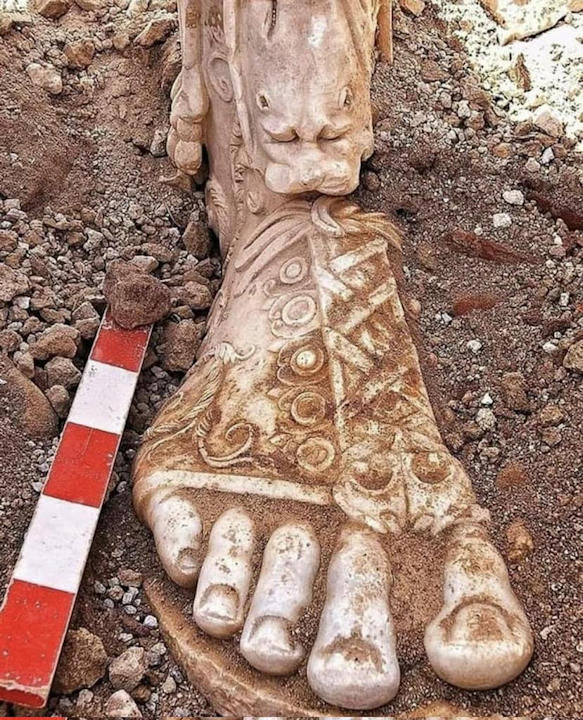A. Sutherland - AncientPages.com - Often called the "philosopher on the throne" or the "philosopher-emperor," Marcus Aurelius (121 AD - 180 AD) was a powerful Roman Emperor who ruled for nearly two decades.
The Statue of Marcus Aurelius in the Musei Capitolini in Rome. Credit: Zanner/Wikimedia Commons.
When he died, his son built an impressive column that stands 100 feet high and bears a band of reliefs.
Who Was Emperor Marcus Aurelius?
Emperor Aurelius was not only a military leader but also a scholar who was known for his intellectual pursuits. His most significant scholarly interest was Stoicism, a philosophy that emphasized fate, reason, and self-restraint.
Chosen by Emperor Hadrian to be his eventual successor, Aurelius took control of the Roman Empire in 161 AD along with his brother Verus.
Foot of a marble sculpture of Marcus Aurelius unearthed in Southern Turkey. Emperor Aurelius was not only a military leader but also a scholar known for his intellectual pursuits. Credit: SARP
When his brother died in 177 AD, Aurelius reigned as the sole emperor for three years until he died in 180 AD.
He was one of the most respected Roman emperors, but he came to power when the Roman Empire was marked by war and disease. In the 160s, Romans battled with the Parthian empire for control over lands in the East.
When the Parthian War ended, Aurelius and Verus faced another military conflict with German tribes in the late 160s. German tribes crossed the Danube River and attacked a Roman city.
Fragment of the Column of Marcus Aurelius. Credit: Public Domain
Contrary to Augustus, "who enlisted large numbers of freed slaves to help bulk up his army, Marcus Aurelius used groups of former gladiators on his campaigns in the Danube. At this time, the Roman army just did not have access to sufficient numbers of soldiers needed compared to the old manpower.
In the fourth century CE, the emperors simply found that the combination of a declining population and the quick expansion of the army together made it too difficult to raise large numbers of soldiers needed to protect her borders..." (Jackson, Roy. Rome: Roman Empire)
In 175 AD, Emperor Aurelius was challenged by Avidius Cassius, who claimed the title of emperor for himself.
A fragment of the column. Credit: Barosaurus Lentus - CC BY-SA 3.0
Avidius Cassius had heard rumors Aurelius was ill and thought it was an excellent opportunity to get to power. Emperor Aurelius never had to engage in direct military conflict with Avidius Cassius because his soldiers killed him.
What makes Emperor Marcus Aurelius unique is that he is not remembered as a great military leader but as a person driven by reason.
A collection of his thoughts has been published in a work entitled The Meditations. Based on his Stoic beliefs, the work consists of his notes on life.
The Column of Marcus Aurelius is a Roman victory column in Piazza Colonna, Rome, ItalyCredit: Marco Assini - CC BY-SA 2.0
"Everything we hear is an opinion, not a fact. Everything we see is a perspective, not the truth." - Marcus Aurelius
Impressive Column Of Marcus Aurelius In Rome
Inspired by its more famous predecessor, Trajan's Column, the Column of Marcus Aurelius stands in Piazza Colonna in Rome. It was erected by Commodus (161 AD. – 192), the son of Marcus Aurelius.
The column was nicknamed Centenaria, "hundredfooter," because it was 100 Roman feet or 29.60 meters high.
Lower part of the column. Credit: Public Domain
On the top of the column was a statue of Marcus Aurelius; today, the apostle Paul stands there.
The inscription on the base of the column gives the honorific title of Emperor Aurelius.
Updated on October 12, 2022
Written by: A. Sutherland - AncientPages.com Senior Staff Writer
Copyright © AncientPages.com All rights reserved. This material may not be published, broadcast, rewritten or redistributed in whole or part without the express written permission of AncientPages.com







